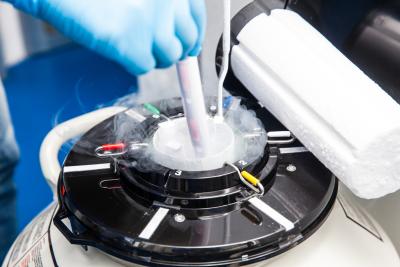At 23 years old, Roshni Kamta could only focus on her recent breast cancer diagnosis, not future parenthood. When Kahmta’s surgeon suggested she add egg extraction to her medical to-do's, she took the appointment without much thought.
Now in remission and with her eggs safely tucked away in the new generation of egg storage by TMRW Life Sciences, Kamta can continue to focus on other things.
“It's like the one thing from a medical perspective that I don't have to think about,” Kamta told Fierce Healthcare. One of the reasons for her trust in the security of her eggs, Kahmta said, is the fact that they are not stored in the traditional manual drums but in an automated storage facility developed by TMRW Life Sciences.
“Cancer is a very weird thing to go through in general but especially weird to go through when you're young,” Kamta said. “People who are older are more established in their lives ... they're married, have their kids, they know how to pay a mortgage and taxes. It's hard to do cancer when you're still trying to figure out your life.”
Founded in 2018, TMRW Life Sciences is a fertility technology company that built technology to improve the traditional method of storing eggs in drums, which is a process prone to failure and errors. The company says its CryoRobot Select is the first and only FDA-cleared automated platform that digitally tracks, monitors and stores frozen eggs and embryos.
Executives say the next-generation technology provides a new standard of care to fertility clinics and their patients. One such cryobank is in lower Manhattan. In what appears to be a state-of-the-art ice cream vending machine rest roughly 1,000 frozen embryos. TMRW’s proprietary software assigns a unique identifier for each specimen, capturing inventory in real time and reducing a majority of the manual, potential points of failure within the cryogenic process.
Lou Villalba, TMRW chief business officer, told Fierce Healthcare that the reasons for the leaps and bounds between stages of embryo storage are largely due to an industry built on the fly. Egg freezing as a specialty first started with oncology fertility patients like Kamta who didn’t want to sacrifice one more thing to cancer.

The science of egg freezing improved, people had children later, demand grew, but storage hasn’t caught up, he said. IVF clinics became the center of storage with basements full of drums and vials marked with handwritten labels held in communal baskets. With such rudimentary technology, thawing happens quick and eggs are lost.
“The freezing rates really started to change around 2010,” Villalba said. “The volumes increased. but the methods that were in place didn't change. You can see the friction point there. There are a lot of spreadsheets at a lot of IVF clinics across the country that were set up not imagining that they were going to be in use for 10 years.”
TMRW's platform has been adopted in fertility clinics across the country, including Vios Fertility/Kindbody, Boston IVF, CCRM Fertility, San Diego Fertility Center, Conceptions Reproductive Associates of Colorado, Institute for Reproductive Medicine and Science and RMA of New York.
TMRW’s CryoRobot Select has the only FDA-approved specimen management system with a complete digital chain of custody. The company says its technology reduces potential points of failure in the existing manual systems by 94%.
Demand for fertility services and egg freezing continues to climb. According to the Society for Assisted Reproductive Technology, the number of healthy women freezing eggs rose to 12,438 in 2020 from 7,193 in 2016. Successful birth rates increase as eggs retrieved increase partially because of the number of eggs lost to freezing and thawing.
“Specimen storage and management is becoming a very important topic because there's been, unfortunately, mix ups, tank failures that have gotten the attention, which create damages and those damages have to be settled,” Villalba said.
As malpractice suits and insurance companies look to clinic liabilities, TMRW developed technology to address points of failure in the specimen management process.
The machines have backup liquid nitrogen and generators. Thousands of wellness checks are performed each day without specimen ever being touched by human hands or removed from storage. From a screen at the front of the machine, technicians’ retinas are scanned to ensure security and accountability.
CCRM Fertility's chief laboratory officer Jason Swain, Ph.D., transferred his facility's storage to TMRW cryobanks. He told Fierce Healthcare that the move was largely taken to address storage capacity and space challenges along with the labor-intensive process of manual inventory.
"We adjusted our workflow to accommodate the new technology," Swain said. "While there are differences that staff had to adjust to, the new technology has improved safety and added efficiencies overall which justify these adjustments."
Kamta is one of many young cancer survivors whose eggs have been frozen in TMRW’s cryobanks through a collaboration with Chick Mission, a nonprofit organization working to provide women diagnosed with cancer with a future in fertility.
TMRW is continuing to grow with Villalba’s recent appointment as CBO, Tara Comonte's appointment as CEO in 2021and recent investments from comedian Amy Schumer, who joined existing investors including GV, formerly Google Ventures.
The company has raised $153 million to date, according to Crunchbase.